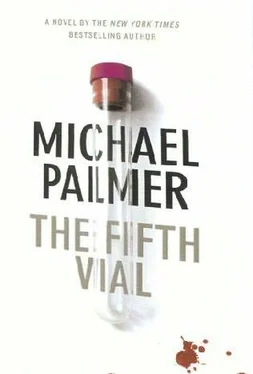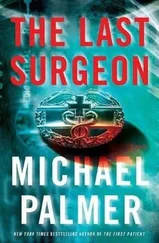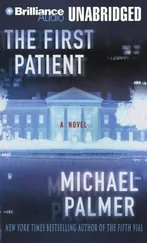Michael Palmer - The fifth vial
Здесь есть возможность читать онлайн «Michael Palmer - The fifth vial» весь текст электронной книги совершенно бесплатно (целиком полную версию без сокращений). В некоторых случаях можно слушать аудио, скачать через торрент в формате fb2 и присутствует краткое содержание. Жанр: Триллер, на английском языке. Описание произведения, (предисловие) а так же отзывы посетителей доступны на портале библиотеки ЛибКат.
- Название:The fifth vial
- Автор:
- Жанр:
- Год:неизвестен
- ISBN:нет данных
- Рейтинг книги:4 / 5. Голосов: 1
-
Избранное:Добавить в избранное
- Отзывы:
-
Ваша оценка:
- 80
- 1
- 2
- 3
- 4
- 5
The fifth vial: краткое содержание, описание и аннотация
Предлагаем к чтению аннотацию, описание, краткое содержание или предисловие (зависит от того, что написал сам автор книги «The fifth vial»). Если вы не нашли необходимую информацию о книге — напишите в комментариях, мы постараемся отыскать её.
The fifth vial — читать онлайн бесплатно полную книгу (весь текст) целиком
Ниже представлен текст книги, разбитый по страницам. Система сохранения места последней прочитанной страницы, позволяет с удобством читать онлайн бесплатно книгу «The fifth vial», без необходимости каждый раз заново искать на чём Вы остановились. Поставьте закладку, и сможете в любой момент перейти на страницу, на которой закончили чтение.
Интервал:
Закладка:
Natalie nodded. Her deep trachea was suctioned out, a totally unpleasant sensation for her. Then, as instructed by the anesthesiologist, she coughed, and just like that, the tube was out. For several minutes, all she could do was lie still, a mask in place, taking in humidified oxygen in slow, deep, grateful gulps. A pervasive, quiet tension held as she adjusted to the change, waiting fearfully for signs that her breathing was deteriorating and a new tube needed to be inserted. French examined her several times, and then finally thanked the anesthesiologist and sent him away. Natalie continued almost motionless, gauging her degree of discomfort, anxiety, and air hunger.
Something wasn't right.
Even after two days, the odor of smoke was still present, probably coming from within her nose and sinuses. Although her vision was unclouded, her eyes still felt gritty and uncomfortable, despite an ointment that was being layered under her lower lid every few hours. But the real trouble, she sensed, was in her lung. Thanks to her intense workouts during therapy, her breathing had come to feel essentially normal. Now, de- spite being able to inhale deeply, it felt as if not quite enough air was getting in with each breath — not enough to be called air hunger, or even to cause panic, but she knew her body as only an athlete could, and something wasn't right. A look at Rachel's expression and Natalie could tell the pulmonologist knew as well.
"You okay?" French asked.
"I don't know, am I?"
"You're doing fine."
Natalie could see the concern shadowing her doctor's face.
"You're doing fine. Isn't that what they told Marie Antoinette…right before they dropped the blade?"
The mid-sentence pause she took to breathe wasn't natural. "Believe me, your outlook is significantly rosier than hers was," French replied, smiling at the image, "but even though I thought you were well enough to have the tube removed, your oxygen saturation is still a little low, and you still have some edema fluid in parts of your lung. I think that's what you're feeling right now."
"You expect that to go away?"
"Much of it has already."
"But were the alveoli in my lung burned?…Is that why I have the edema and the low oxygen?"
"Nat, you did inhale a lot of smoke and hyper heated air."
Natalie felt a knot of fear materialize in her chest.
"And?"
French raised the head of the bed past forty-five degrees, then sat on the edge.
"The lining of your trachea, bronchial tubes, and alveoli were damaged. There can be no question of that."
"I see. Damaged. That edema fluid is not just a reaction to…my lung having been irritated by the smoke?"
"Some, I'm sure, but a lot of what's happened is from the heat. You know how someone in a fire might have first-, second-, and third-degree burns on his skin? Well, that's what your injuries are — first-, second-, and third-degree burns to the tissue in your lung."
"First and second degree tend to heal completely," Natalie said.
"Exactly. But third-degree burns are full-thickness — through the epidermis, the dermis, and the subcutaneous tissue. Rather than heal as it was, tissue burned to the third degree generally heals by scarring. Scar tissue offers some physical protection, but little in the way of natural function — in your case, gas exchange."
"So the question here is how much…of my lung has third-degree burn."
"And at the moment, we don't know. That was an amazingly heroic thing you did, Nat. I've been praying since they brought you in that the damage isn't too extensive."
"But you don't know," Natalie murmured, as much to herself as to French.
"I don't know. Nat, with what happened to you in Brazil, and now this, you've had a real raw deal. I don't want it to get any worse."
"But it might."
French seemed to be searching for an answer that would skirt the statement.
"We don't know how much damage has been done, or how much of what may be second-degree burn turns out functionally to be third."
"Jesus. Is there anything I can do?"
"Wait a week or so and then we'll get some pulmonary function studies and also get you back into the therapy room."
"I…I don't know if I can."
"The woman who crawled back into that burning house to save a ten-year-old girl can do it."
"I don't know," Natalie said again, trying a deep breath that seemed only marginally to fill her lung. "What if it's bad? What if there's too much damage for me ever to breathe normally?"
French looked at her evenly.
"Nat, you mustn't project like this. You'll end up getting so wrapped up in what might happen that you'll paralyze yourself."
"Wouldn't you want to know?…Wouldn't you want to know if you were ever going to be able to run again?…Or even walk without having to gasp for air?…Isn't there anything I can do?"
"Easy does it, Nat, please."
"There must be something."
"Okay, there is," French said reluctantly. "I've taken the liberty of having your blood sent off for tissue-typing."
"A transplant?"
"I'm not saying you're going to need one, but as you probably know, the process can be a complicated and drawn-out one."
"Get on the list."
"There is a regional list, yes, but for the past year or so it's not like the kidney list, which is sort of a first-come, first-served deal. The lung waiting list involves a pretty complicated mathematical evaluation called the lung allocation score. But listen, this is probably not the time to talk about all this. I only started the process because it's so time-consuming. You are a long way from needing a transplant."
"If I can't be normal or close to normal," Natalie said, "I don't think I want to live."
French sighed.
"Nat, I really should have waited to bring all this up. I'm sorry."
"I'm blood type O, you know. That's the most difficult blood type to match for a transplant."
"Nat, please."
"No way I'm going to take immunosuppressant drugs…every day for the rest of my life…They cause a list of side effects as long as my arm…Infection, osteoporosis, diabetes, renal failure."
"Honey, please, take a deep breath and get a hold of yourself. You're running way ahead with this thing. I don't even know if you're ever even going to — "
"I'm never going to be right, am I?…No matter what I'm never going to run again…And a surgical residency takes stamina — so does standing in the OR for hours at a time…There's no chance I'm going to make it as a surgeon…when I can't even walk to the damn corner grocery without getting winded. How much can a person take?"
Instead of recoiling from Natalie's projections and verbal onslaught, Rachel French did what came naturally to her as a physician, moving forward and putting her arms around her patient.
"Easy," she whispered. "Easy does it, Nat."
Natalie momentarily felt herself about to break down. Instead, she stiffened and stared stonily at the opposite wall, her tears unshed.
The next twenty-four hours did not pass pleasantly, even though Natalie sensed some small improvement in her breathing. She certainly felt grateful at having been able to save her mother and niece, but still the depression that accompanied news of her lung damage continued to deepen. Her psychotherapist stopped by several times, and finally succeeded in getting her to try a mild antidepressant. Rather than give the medication a chance, Natalie convinced a friend to bring in her laptop, and spent much of her time awake and online, reading about lung transplantation, tissue-typing, histocompatibility, and the newly adopted formula for deciding who would receive one of the very limited supply of lungs — the lung allocation score.
Heavily weighted in determining the score was the survival probability for the upcoming year. Very little emphasis in the complex mathematical equations was given to the extent of disability — only to the likelihood of death. Natalie's already deflated mood became even more somber as she realized that the rather remote possibility she would die in the near future actually mitigated against her even being considered for a transplant. She could drag herself around indefinitely, working for every breath, but that didn't count. Quality of life mattered little when measured against quantity.
Читать дальшеИнтервал:
Закладка:
Похожие книги на «The fifth vial»
Представляем Вашему вниманию похожие книги на «The fifth vial» списком для выбора. Мы отобрали схожую по названию и смыслу литературу в надежде предоставить читателям больше вариантов отыскать новые, интересные, ещё непрочитанные произведения.
Обсуждение, отзывы о книге «The fifth vial» и просто собственные мнения читателей. Оставьте ваши комментарии, напишите, что Вы думаете о произведении, его смысле или главных героях. Укажите что конкретно понравилось, а что нет, и почему Вы так считаете.












